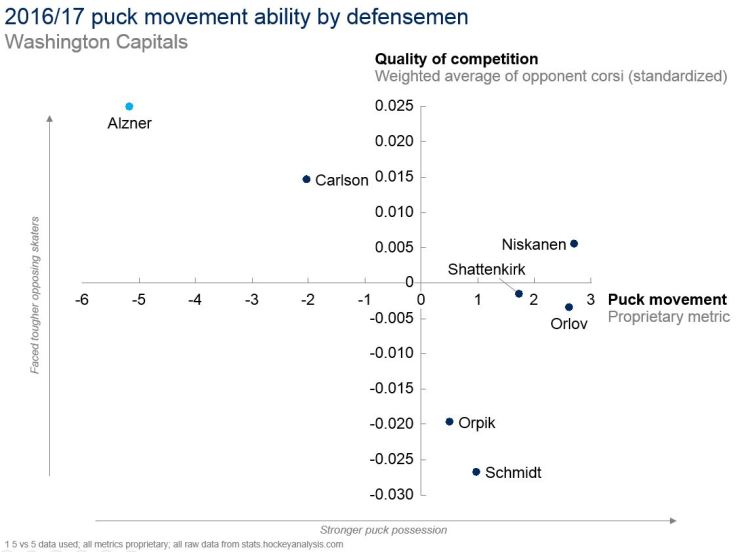Karl Alzner (28, UFA) is an intriguing name to watch in free agency. He comes with the reputation of being a top-4, minute eating d-man and benefits from the luxury of having played for a top team throughout his career. He’s sure to attract interest from several teams come July 1 – but how much dollar and term make it a worthwhile investment? Let’s explore.
Karl Alzner struggles as a puck mover
In today’s NHL (faster pace, more penalties), the ability to move the puck and drive possession is a critical skill to look for in any defenseman. In that regard, Alzner struggled immensely in 2016/17. His puck movement factor (PMF) of -5.16 was worst on the Caps.

Alzner did face the strongest opposition and started more shifts in the defensive zone than any Capitals’ defender. That said, he routinely failed to drive possession and make the teammates around him better. Consider the example of several top Capitals’ forwards:
WITHOUT Alzner: Ovechkin, Backstrom, and Oshie posted possession numbers (CF%) of 53.3%, 52.9%, and 54.7%, respectively.
WITH Alzner, those same players posted 48.2%, 45.4%, and 46.7%, respectively.
That is a staggering difference, regardless of who you’re facing against.
Is this just a bad season or a concerning trend? The latter. What makes these numbers even more worrisome is that this appears to be a downward trend in Alzner’s game. Let’s look at his PMF over the past 7 seasons:

Alzner plays a physical game and has been quite healthy (not missing a regular season game the past 4 seasons). Perhaps the heavy workload has taken its’ toll. That’s purely speculation – what isn’t is the dramatic decline in Alzner’s ability to drive possession and move the puck, generating shots and scoring chances.
Alzner’s never been a premier puck mover. But he posted serviceable PMF numbers akin to a third pairing while playing a solid defensive games against top quality of competition. The past 2 years highlight a significant decline in an area that was never a strength.
His defensive game
Measuring the value of a ‘defensive’ defenseman is tricky. Being able to drive possession and move the puck is essential for any defenseman, although one might argue that a solid shutdown defenseman would limit shots to the outside, etc. so that despite showing poor possession numbers, they carry some value in a defensive role.
We ran a quick goal suppression analysis on Alzner:

What we did was measure Alzner’s goals-against per 60 (e.g., goals scored by opponents when Alzner is on the ice at even strength per 60 minutes of ice time) and adjusted based on 3 primary factors:
- Goalie save % when he’s on relative to team save %
- Team defensive ability relative to league average (rationale: being on a strong defensive team would inflate one’s GA60)
- Suppression factor (rationale: looking at opponents GF60 on the ice vs Alzner vs on the ice not against Alzner)
We also bake in quality of competition and zone start time.
In that regard, Alzner is above average and appears to be solid defensively against some strong competition.
Fit with the Habs
There are rumors swirling in Montreal about mutual interest between the Habs and Alzner. At the surface, it’s easy to get excited about a “top-4” defenseman who’s been part of an excellent team. Beyond the surface, however, there are many concerns.

Alzner faced similar level of competition to Emelin and Weber, yet had poorer puck movement numbers than either of them.
Verdict
It is important to recognize that this analysis focuses primarily on Alzner’s ability as a puck mover. Other characteristics (e.g., PP/PK ability, character, physicality, others) should all go into a team’s evaluation of a player. That said – and not to sound like a broken record – puck movement in today’s game is critical.
And as a puck mover, Alzner is no better than a bottom pairing guy. Over the past 2 seasons, he hasn’t even been that. While he brings defensive ability, grit, and experience, Alzner appears to be on a downward trend. Watching the Pittsburgh Penguins win the cup two years in a row, GMs around the league recognize the importance of transition, speed, and strong puck movement.
If teams around the league are hoping to replicate that model, they’re better suited to steer away from Karl Alzner.